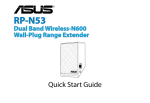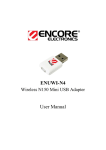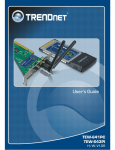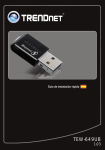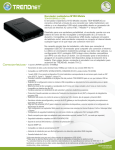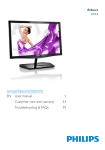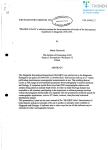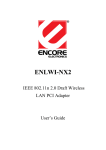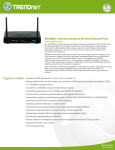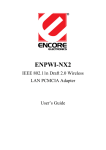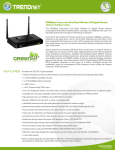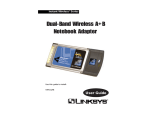Download TRENDnet NSPEED TEW-649UB User's Manual
Transcript
Federal Communication Commission Interference Statement This equipment has been tested and found to comply with the limits for a Class B digital device, pursuant to Part 15 of the FCC Rules. These limits are designed to provide reasonable protection against harmful interference in a residential installation. This equipment generates, uses and can radiate radio frequency energy and, if not installed and used in accordance with the instructions, may cause harmful interference to radio communications. However, there is no guarantee that interference will not occur in a particular installation. If this equipment does cause harmful interference to radio or television reception, which can be determined by turning the equipment off and on, the user is encouraged to try to correct the interference by one of the following measures: ‐ Reorient or relocate the receiving antenna. ‐ Increase the separation between the equipment and receiver. ‐ Connect the equipment into an outlet on a circuit different from that to which the receiver is connected. ‐ Consult the dealer or an experienced radio/TV technician for help. FCC Caution: Any changes or modifications not expressly approved by the party responsible for compliance could void the user's authority to operate this equipment. This device complies with Part 15 of the FCC Rules. Operation is subject to the following two conditions: (1) This device may not cause harmful interference, and (2) this device must accept any interference received, including interference that may cause undesired operation. IMPORTANT NOTE: FCC Radiation Exposure Statement: This equipment complies with FCC radiation exposure limits set forth for an uncontrolled environment. End users must follow the specific operating instructions for satisfying RF exposure compliance. To maintain compliance with FCC RF exposure compliance requirements, please follow operation instruction as documented in this manual. This transmitter must not be co‐located or operating in conjunction with any other antenna or transmitter. SAR compliance has been established in typical laptop computer(s) with USB slot, and product could be used in typical laptop computer with USB slot. Other application like handheld PC or similar device has not been verified and may not compliance with related RF exposure rule and such use shall be prohibited. The availability of some specific channels and/or operational frequency bands are country dependent and are firmware programmed at the factory to match the intended destination. The firmware setting is not accessible by the end user. For Taiwan 警語:
經型式認證合格之低功率射頻電機,非經許可,公司、商號或使用者均不得擅自變更頻率、加大功率或變更原設計之
特性及功能。
低功率射頻電機之使用不得影響飛航安全及干擾合法通信;經發現有干擾現象時,應立即停用,並改善至無干擾時方
得繼續使用。前項合法通信,指依電信法規定作業之無線電通信。低功率射頻電機須忍受合法通信或工業、科學及醫
療用電波輻射性電機設備之干擾。
i
Europe – EU Declaration of Conformity
This device complies with the essential requirements of the R&TTE Directive 1999/5/EC. The following test methods have been
applied in order to prove presumption of conformity with the essential requirements of the R&TTE Directive 1999/5/EC:
EN60950-1: 2006
Safety of Information Technology Equipment
EN 62311: 2008
Assessment of electronic and electrical equipment related to human exposure restrictions for electromagnetic fields (0 Hz – 300GHz)
EN 300 328 V1.7.1 (2006-10)
Electromagnetic compatibility and Radio spectrum Matters (ERM); Wideband transmission systems; Data transmission equipment
operating in the 2,4 GHz ISM band and using wide band modulation techniques; Harmonized EN covering essential requirements
under article 3.2 of the R&TTE Directive
EN 301 489-1 V1.8.1 (2008-04)
Electromagnetic compatibility and Radio Spectrum Matters (ERM); ElectroMagnetic Compatibility (EMC) standard for radio
equipment and services; Part 1: Common technical requirements
EN 301 489-17 V1.3.2 (2008-04)
Electromagnetic compatibility and Radio spectrum Matters (ERM); ElectroMagnetic Compatibility (EMC) standard for radio
equipment and services; Part 17: Specific conditions for 2,4 GHz wideband transmission systems and 5 GHz high performance RLAN
equipment
This device is a 2.4 GHz wideband transmission system (transceiver), intended for use in all EU member states and EFTA countries,
except in France and Italy where restrictive use applies.
In Italy the end-user should apply for a license at the national spectrum authorities in order to obtain authorization to use the device
for setting up outdoor radio links and/or for supplying public access to telecommunications and/or network services.
This device may not be used for setting up outdoor radio links in France and in some areas the RF output power may be limited to 10
mW EIRP in the frequency range of 2454 – 2483.5 MHz. For detailed information the end-user should contact the national spectrum
authority in France.
0560
Česky [Czech]
TRENDnet tímto prohlašuje, že tento TEW-649UB je ve shodě se
základními požadavky a dalšími příslušnými ustanoveními
směrnice 1999/5/ES.
Dansk [Danish]
Undertegnede TRENDnet erklærer herved, at følgende udstyr TEW649UB overholder de væsentlige krav og øvrige relevante krav i
direktiv 1999/5/EF.
Deutsch [German]
Hiermit erklärt TRENDnet, dass sich das Gerät TEW-649UB in
Übereinstimmung mit den grundlegenden Anforderungen und den
übrigen einschlägigen Bestimmungen der Richtlinie 1999/5/EG
befindet.
Eesti [Estonian]
Käesolevaga kinnitab TRENDnet seadme TEW-649UB vastavust
ii
direktiivi 1999/5/EÜ põhinõuetele ja nimetatud direktiivist
tulenevatele teistele asjakohastele sätetele.
English
Hereby, TRENDnet, declares that this TEW-649UB is in compliance
with the essential requirements and other relevant provisions of
Directive 1999/5/EC.
Español [Spanish]
Por medio de la presente TRENDnet declara que el TEW-649UB
cumple con los requisitos esenciales y cualesquiera otras
disposiciones aplicables o exigibles de la Directiva 1999/5/CE.
Ελληνική [Greek]
ΜΕ ΤΗΝ ΠΑΡΟΥΣΑ TRENDnet ΔΗΛΩΝΕΙ ΟΤΙ TEW-649UB
ΣΥΜΜΟΡΦΩΝΕΤΑΙ ΠΡΟΣ ΤΙΣ ΟΥΣΙΩΔΕΙΣ ΑΠΑΙΤΗΣΕΙΣ
ΚΑΙ ΤΙΣ ΛΟΙΠΕΣ ΣΧΕΤΙΚΕΣ ΔΙΑΤΑΞΕΙΣ ΤΗΣ ΟΔΗΓΙΑΣ
1999/5/ΕΚ.
Français [French]
Par la présente TRENDnet déclare que l'appareil TEW-649UB est
conforme aux exigences essentielles et aux autres dispositions
pertinentes de la directive 1999/5/CE.
Italiano [Italian]
Con la presente TRENDnet dichiara che questo TEW-649UB è
conforme ai requisiti essenziali ed alle altre disposizioni pertinenti
stabilite dalla direttiva 1999/5/CE.
Latviski [Latvian]
Ar šo TRENDnet izgatavotāja nosaukums] deklarē, ka TEW-649UB
atbilst Direktīvas 1999/5/EK būtiskajām prasībām un citiem ar to
saistītajiem noteikumiem.
Lietuvių [Lithuanian]
Šiuo TRENDnet deklaruoja, kad šis TEW-649UB atitinka esminius
reikalavimus ir kitas 1999/5/EB Direktyvos nuostatas.
Nederlands [Dutch]
Hierbij verklaart TRENDnet dat het toestel TEW-649UB in
overeenstemming is met de essentiële eisen en de andere relevante
bepalingen van richtlijn 1999/5/EG.
Malti [Maltese]
Hawnhekk, TRENDnet, jiddikjara li dan TEW-649UB jikkonforma
mal-ħtiġijiet essenzjali u ma provvedimenti oħrajn relevanti li
hemm fid-Dirrettiva 1999/5/EC.
Magyar [Hungarian]
Alulírott, TRENDnet nyilatkozom, hogy a TEW-649UB megfelel a
vonatkozó alapvetõ követelményeknek és az 1999/5/EC irányelv
egyéb elõírásainak.
Polski [Polish]
Niniejszym TRENDnet oświadcza, że TEW-649UB jest zgodny z
zasadniczymi wymogami oraz pozostałymi stosownymi
postanowieniami Dyrektywy 1999/5/EC.
Português [Portuguese]
TRENDnet declara que este TEW-649UB está conforme com os
requisitos essenciais e outras disposições da Directiva 1999/5/CE.
Slovensko [Slovenian]
TRENDnet izjavlja, da je ta TEW-649UB v skladu z bistvenimi
zahtevami in ostalimi relevantnimi določili direktive 1999/5/ES.
Slovensky [Slovak]
TRENDnet týmto vyhlasuje, že TEW-649UB spĺňa základné
požiadavky a všetky príslušné ustanovenia Smernice 1999/5/ES.
Suomi [Finnish]
TRENDnet vakuuttaa täten että TEW-649UB tyyppinen laite on
direktiivin 1999/5/EY oleellisten vaatimusten ja sitä koskevien
direktiivin muiden ehtojen mukainen.
Svenska [Swedish]
Härmed intygar TRENDnet att denna TEW-649UB står I
överensstämmelse med de väsentliga egenskapskrav och övriga
relevanta bestämmelser som framgår av direktiv 1999/5/EG.
iii
TABLE OF CONTENT
Introduction .............................................................................................................. 5 Unpacking and Setup ................................................................................................ 6 Unpacking ............................................................................................................... 6 System Requirements ............................................................................................. 6 IDentifying external components ............................................................................. 7 LED .......................................................................................................................... 7 WPS Button............................................................................................................. 7 Wireless Performance Considerations ...................................................................... 8 Software Installation ................................................................................................. 9 Windows Based Utility Installation ......................................................................... 9 Wireless Utility Setting ............................................................................................ 14 Link Information ................................................................................................... 14 Configuration ........................................................................................................ 15 Site Survey ............................................................................................................ 19 Profile ................................................................................................................... 20 WPS ....................................................................................................................... 22 About .................................................................................................................... 27 Technical Specifications .......................................................................................... 28 iv
INTRODUCTION Congratulations on your purchase of this Wireless N USB Adapter. This manual contains detailed instructions regarding the operation of this product. Please keep this manual for future reference. With the Wireless N USB Adapter, a desktop or laptop computer can communicate with another computer wirelessly. An easy‐to‐use utility is bundled with the Wireless USB Adapter for configuration, monitoring, and diagnostic purposes. The Wireless N USB Adapter can wirelessly transmit and receive data, at a speed of up to 150 megabits per second. The Wireless N USB Adapter provides users with access to real‐time information anywhere in their organization. The mobility of the Wireless N USB Adapter provides productivity and service, which are not available under wired networks. The Wireless N USB Adapter can easily adapt from peer‐to‐peer networks, suitable for a small number of users, to full infrastructure networks of thousands of users that allow roaming around a broad area. 5
UNPACKING AND SETUP This section provides unpacking and setup information for the Wireless N USB Adapter. Unpacking The box should contain the following items:
TEW‐649UB Wireless N USB Adapter
Multi‐Language Quick Installation Guide
CD‐ROM (Utility & Driver) If any item is found missing or damaged, please contact your local reseller for replacement. System Requirements Before installation, check the following:
Make sure your computer is running at least a 300MHz or above processor with 256MB RAM or above
Make sure the USB ports are is USB 2.0 port
The operating system on your computer must be the following: Windows 2000 (Service Pack 4), XP (Service Pack 2), Windows Vista, Windows 7
A draft 802.11n or 802.11b/g access point.
Make sure the environment has minimal interference and obstructions. 6
IDENTIFYING EXTERNAL COMPONENTS LED LED Status Description Slow Blink (1 blink/second) When the LED is blinking, the WLAN Adapter is transmitting or receiving data on the Wireless Ethernet network. After pressing the WPS button, the LED will flash 3 blinks/second. Once the connection is successfully established between the AP and the adapter, the LED Fast Blink (3 blinks/second) will remain solid for 5 seconds to tell the users that the connection has been established. After 5 seconds , the LED will turn off to indicate that the AP is ready for a new WPS connection and the adapter is associated with the AP. Off User inserts the card into the NB without driver installed, and without connection. WPS Button Press the WPS button start the WPS pairing, the LED will begins to blinking for 3 blinks/second, once the connection is successfully established between the AP and the adapter, the LED will remain in solid for 5 seconds to tell the users that the connection has been established. After 5 second, the LED will light off to indicate user that the Access Point or Wireless Router is ready for a new WPS connection and the adapter is associated with the Access Point or Wireless Router. 7
WIRELESS PERFORMANCE CONSIDERATIONS There are a number of factors that can impact the range of wireless devices. 1. Adjust your wireless devices so that the signal is traveling in a straight path, rather than at an angle. The more material the signal has to pass through the more signal you will lose. 2. Keep the number of obstructions to a minimum. Each obstruction can reduce the range of a wireless device. Position the wireless devices in a manner that will minimize the amount of obstructions between them. 3. Building materials can have a large impact on your wireless signal. In an indoor environment, try to position the wireless devices so that the signal passes through less dense material such as dry wall. Dense materials like metal, solid wood, glass or even furniture may block or degrade the signal. 4. Antenna orientation can also have a large impact on your wireless signal. Use the wireless adapter’s site survey tool to determine the best antenna orientation for your wireless devices. 5. Interference from devices that produce RF (radio frequency) noise can also impact your signal. Position your wireless devices away from anything that generates RF noise, such as microwaves, radios and baby monitors. 6. Any device operating on the 2.4GHz frequency will cause interference. Devices such as 2.4GHz cordless phones or other wireless remotes operating on the 2.4GHz frequency can potentially drop the wireless signal. Although the phone may not be in use, the base can still transmit wireless signal. Move the phone’s base station as far away as possible from your wireless devices. If you are still experiencing low or no signal consider repositioning the wireless devices or installing additional access points. The use of higher gain antennas may also provide the necessary coverage depending on the environment. 8
SOFTWARE INSTALLATION This section describes how to install the driver and utility for the Wireless N USB Adapter. Windows Based Utility Installation 1) Insert the Utility and Driver CD‐ROM into your computer’s CD‐ROM drive and then click Install Utility. 2) Follow the InstallShield Wizard Instructions 9
3) Click Finish. 4) Plug the Wireless N USB Adapter into an available USB slot on your computer. Driver Installation Windows Vista 1) Drivers will install automatically. Windows XP 1) The Found New Hardware Wizard appears Select No, not this time and then click Next. 10
2) Select Install this software automatically (recommended and then click Next. 11
3) Click Continue Anyway. 4) Click Finish. 12
Windows 2000 1) Click Yes. 13
WIRELESS UTILITY SETTING The user can configure the wireless settings using the Wireless Adapter Configuration Utility. Double‐click the utility icon that appears in the taskbar. The Wireless Adapter Configuration Utility is divided into six sections: Link Info, Configuration, Site Survey, Profile, WPS and About. Link Information This is the default screen after launching the Utility program. Status: Shows the associated BSSID (MAC address), which can be used to identify the wireless access point or router that you are connecting to. SSID: Shows the current SSID, which must be the same as your wireless access point or router in order to establish the connection correctly. Frequency: Shows the current frequency used for your wireless network. Wireless Mode: Shows the current wireless mode used. Encryption: Shows the current encryption mode used. TxRate: Shows the current data rate used for transmitting. 14
Channel: Shows the current channel for communication. Link Quality: Shows the link quality of the Wireless N USB Adapter with the Access Point when operating under Infrastructure mode. Signal Strength: Shows the wireless signal strength of the connection between the Wireless N USB Adapter with the Access Point. Data Rate: Shows the statistics of data transfer, and the calculation is based on the number of packets transmitted and received. Configuration This screen is where you set the basic wireless settings for the Wireless N USB Adapter. Profile Name: You can modify the Profile Name to anything you would like, for example Home, Office, PlayRoom and etc. SSID: Service Set Identifier, which is a unique name shared among all wireless clients in a wireless network. The SSID must match the wireless access point or router’s SSID that you are connecting to. Wireless Mode: There are two modes available for selection 15
● Infrastructure – to establish wireless communication with the LAN and other wireless clients through the use of Access Points or Wireless Router. This is most common type of connection. ● Ad‐Hoc – to establish point‐to‐point wireless communication directly with other wireless client devices. Authentication: The following options are available: Open System, Shared Key, WPA‐PSK, WPA2‐PSK, WPA EAP‐TLS, WPA2 EPA‐TLS . Select Open System, Shared Key for WEP data encryption feature. Open or Shared Key Open System and Shared Key require the user to set a WEP key to exchange data with other wireless clients that have the same WEP key. WEP is considered basic level of wireless encryption, if you would like higher security connection, WPA2 encryption is recommended. z Default Key: select one of the 4 keys to use. z Network Key: choose the encryption way, either in HEX or ASCII formats, and enter the password in the blank space. z Key Length: select 64 or 128 bits as the length of the keys Key Format: HEX or ASCII Key Length
Hex
ASCII
Type
characters 0-9, A-F, a-f
alphanumeric format
64-bit
10 characters
5 characters
128-bit
26 characters
13 characters
16
WPA‐PSK / WPA2‐PSK If using the WPA‐PSK/WPA2‐PSK authentication method, please select the Encryption type for TKIP or AES then enter the Passphrase key. The minimum length is 8 characters. 17
WPA EAP‐TLS If using the WPA/WPA2 EAP‐TLS authentication method, please select the Encryption type for TKIP or AES then select the WPA/WPA2 Certificate from drop down list. 18
Site Survey This screen allows the user to scan for available wireless network. It also allows the user to establish wireless communications with an target device. Available Network – displays the wireless networks (wireless clients, access points or routers) that are within range. Select any one of the wireless networks by double‐clicking on it or select the SSID then click the “Connect” button. Click the “Refresh” button to scan for available networks. 19
Profile Profile – The user can create and manage the created profiles for home, work or public areas. By double‐clicking on one of the created profile, the setting will adjust to the specific setting such as SSID, channel, and encryption as saved by that particular profile. Add: Adds a profile. The following screen will appear. The user can enter the necessary information required for accessing the particular Access Point or Wireless Router. Remove: Deletes the selected profile Edit: Edit an exist profile. The screen will back to profile. Edit the SSID and select the Wireless Mode, Authentication and Encryption then click Apply to save the profile. When the Profile name was changed, a new profile will be added in the list. 20
Connect: Selected a profile from list then click the Connect to connecting to the wireless network with the profile setting. 21
WPS Wi‐Fi Protected Setup (WPS) is an optional certification program from the Wi‐Fi Alliance that is designed to ease the task of setting up and configuring security on a wireless network. There are two methods used in the WPS as below instruction. Push the button on my access point Using the WPS configuration with the “Push the button on my access point” method, the configuration steps as below: 1) Selected the “Push the button on my access point”. 2) Push the WPS configuration button on your wireless access point or router. 3) Cliek the Next button start the WPS configuration. 22
4) If the WPS configuration was successful, the follow window will show on. 5) If the WPS configuration was failed, the follow window will show on. 23
Enter a PIN into my access point Using the WPS configuration with the “Enter a PIN into my access point” method, the configuration steps as below: 1) Selected the “Enter a PIN into my access point”, the PIN will be show on the button of the windows. 2) Enter the PIN code into the WPS “Clint PIN number” of you wireless access point or router then click the Start PIN button, the wireless access point or router will start the WPS configuration process. 3) Selected a wireless access point or router which one will be connecting then click the Next button start the WPS configuration. If the “Automatically select the network” was checked, the setup step will be skip. 24
25
4) If the WPS configuration was successful, the follow window will show on. 5) If the WPS configuration was failed, the follow window will show on. 26
About This screen displays information about the Wireless N USB Adapter, such as the Driver and Utility version. When a new version of the utility becomes available for upgrade, users will be able to identify by version numbers. 27
TECHNICAL SPECIFICATIONS Hardware Interface USB 2.0 Standards IEEE 802.11b, IEEE 802.11g and IEEE 802.11n LED Indicator Activity, WPS WPS Button Enables WPS connection Power Consumption Receive mode: 290mA (max) ; Transmit mode : 320mA (max) Supported OS Windows 2000, XP(32/64‐bit)/Vista (32/64‐bit) Dimensions (LxWxH) 33.9 x 17 x 7mm (1.3 x 0.7 x 0.3in) Weight 3g (0.1oz) Temperature Operating: 0° ~ 40° C (32° ~ 104° F); Storage: ‐10° ~ 70° C (14° ~ 158° F) Humidity 10% ~ 95% max (non‐condensing) Certifications CE, FCC Wireless Modulation OFDM, DSSS Antenna Built‐in on board antennas Frequency 2.412 ~ 2.484 GHz Data Rate (auto 802.11b: 11Mbps, 5.5Mbps, 2Mbps, and 1Mbps fallback) 802.11g: 54Mbps, 48Mbps, 36Mbps, 24Mbps, 18Mbps, 12Mbps, 9Mbps and 6Mbps 802.11n: 150Mbps (TX) / 300Mbps (RX) Output Power 802.11b: 15dBm (typical) 802.11g: 14dBm (typical) 802.11n: 12dBm (typical) Receiving Sensitivity 802.11b: ‐78dBm (typical) at 11mpbs 802.11g: ‐65dBm (typical) at 54Mbps 802.11n: ‐61dBm at 150Mbps Encryption 64/128‐bit WEP, WPA/WPA2‐RADIUS, WPA‐PSK/WPA2‐PSK Channels 1~11 (FCC), 1~13 (ETSI) 28
Limited Warranty TRENDnet warrants its products against defects in material and workmanship, under normal use and service, for the following lengths of time from the date of purchase. TEW‐649UB – 3 Years Warranty AC/DC Power Adapter, Cooling Fan, and Power Supply carry 1 year warranty. If a product does not operate as warranted during the applicable warranty period, TRENDnet shall reserve the right, at its expense, to repair or replace the defective product or part and deliver an equivalent product or part to the customer. The repair/replacement unit’s warranty continues from the original date of purchase. All products that are replaced become the property of TRENDnet. Replacement products may be new or reconditioned. TRENDnet does not issue refunds or credit. Please contact the point‐of‐purchase for their return policies. TRENDnet shall not be responsible for any software, firmware, information, or memory data of customer contained in, stored on, or integrated with any products returned to TRENDnet pursuant to any warranty. There are no user serviceable parts inside the product. Do not remove or attempt to service the product by any unauthorized service center. This warranty is voided if (i) the product has been modified or repaired by any unauthorized service center, (ii) the product was subject to accident, abuse, or improper use (iii) the product was subject to conditions more severe than those specified in the manual. Warranty service may be obtained by contacting TRENDnet within the applicable warranty period and providing a copy of the dated proof of the purchase. Upon proper submission of required documentation a Return Material Authorization (RMA) number will be issued. An RMA number is required in order to initiate warranty service support for all TRENDnet products. Products that are sent to TRENDnet for RMA service must have the RMA number marked on the outside of return packages and sent to TRENDnet prepaid, insured and packaged appropriately for safe shipment. Customers shipping from outside of the USA and Canada are responsible for return shipping fees. Customers shipping from outside of the USA are responsible for custom charges, including but not limited to, duty, tax, and other fees. WARRANTIES EXCLUSIVE: IF THE TRENDNET PRODUCT DOES NOT OPERATE AS WARRANTED ABOVE, THE CUSTOMER’S SOLE REMEDY SHALL BE, AT TRENDNET’S OPTION, REPAIR OR REPLACE. THE FOREGOING WARRANTIES AND REMEDIES ARE EXCLUSIVE AND ARE IN LIEU OF ALL OTHER WARRANTIES, EXPRESSED OR IMPLIED, EITHER IN FACT OR BY OPERATION OF LAW, STATUTORY OR OTHERWISE, INCLUDING WARRANTIES OF MERCHANTABILITY AND FITNESS FOR A PARTICULAR PURPOSE. TRENDNET NEITHER ASSUMES NOR AUTHORIZES ANY OTHER PERSON TO ASSUME FOR IT ANY OTHER LIABILITY IN CONNECTION WITH THE SALE, INSTALLATION MAINTENANCE OR USE OF TRENDNET’S PRODUCTS. TRENDNET SHALL NOT BE LIABLE UNDER THIS WARRANTY IF ITS TESTING AND EXAMINATION DISCLOSE THAT THE ALLEGED DEFECT IN THE PRODUCT DOES NOT EXIST OR WAS CAUSED BY CUSTOMER’S OR ANY THIRD PERSON’S MISUSE, NEGLECT, IMPROPER INSTALLATION OR TESTING, UNAUTHORIZED ATTEMPTS TO REPAIR OR MODIFY, OR ANY OTHER CAUSE BEYOND THE RANGE OF THE INTENDED USE, OR BY ACCIDENT, FIRE, LIGHTNING, OR OTHER HAZARD. 29
LIMITATION OF LIABILITY: TO THE FULL EXTENT ALLOWED BY LAW TRENDNET ALSO EXCLUDES FOR ITSELF AND ITS SUPPLIERS ANY LIABILITY, WHETHER BASED IN CONTRACT OR TORT (INCLUDING NEGLIGENCE), FOR INCIDENTAL, CONSEQUENTIAL, INDIRECT, SPECIAL, OR PUNITIVE DAMAGES OF ANY KIND, OR FOR LOSS OF REVENUE OR PROFITS, LOSS OF BUSINESS, LOSS OF INFORMATION OR DATE, OR OTHER FINANCIAL LOSS ARISING OUT OF OR IN CONNECTION WITH THE SALE, INSTALLATION, MAINTENANCE, USE, PERFORMANCE, FAILURE, OR INTERRUPTION OF THE POSSIBILITY OF SUCH DAMAGES, AND LIMITS ITS LIABILITY TO REPAIR, REPLACEMENT, OR REFUND OF THE PURCHASE PRICE PAID, AT TRENDNET’S OPTION. THIS DISCLAIMER OF LIABILITY FOR DAMAGES WILL NOT BE AFFECTED IF ANY REMEDY PROVIDED HEREIN SHALL FAIL OF ITS ESSENTIAL PURPOSE. Governing Law: This Limited Warranty shall be governed by the laws of the state of California. Some TRENDnet products include software code written by third party developers. These codes are subject to the GNU General Public License ("GPL") or GNU Lesser General Public License ("LGPL"). Go to http://www.trendnet.com/gpl or http://www.trendnet.com Download section and look for the desired TRENDnet product to access to the GPL Code or LGPL Code. These codes are distributed WITHOUT WARRANTY and are subject to the copyrights of the developers. TRENDnet does not provide technical support for these codes. Please go to http://www.gnu.org/licenses/gpl.txt or http://www.gnu.org/licenses/lgpl.txt for specific terms of each license. 30
31
































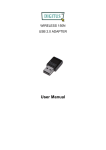
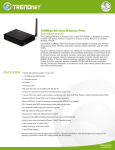
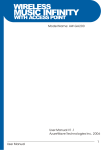
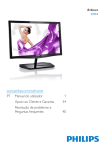
![MC40 Regulatory Guide [English] (P/N 72-166942](http://vs1.manualzilla.com/store/data/006355558_1-b53cce277e35f96f7b0742696fce8bd1-150x150.png)
